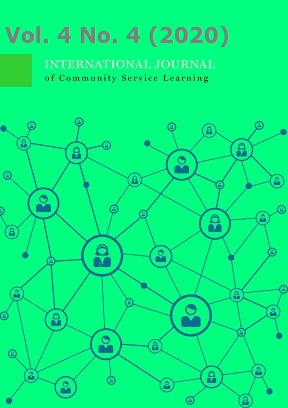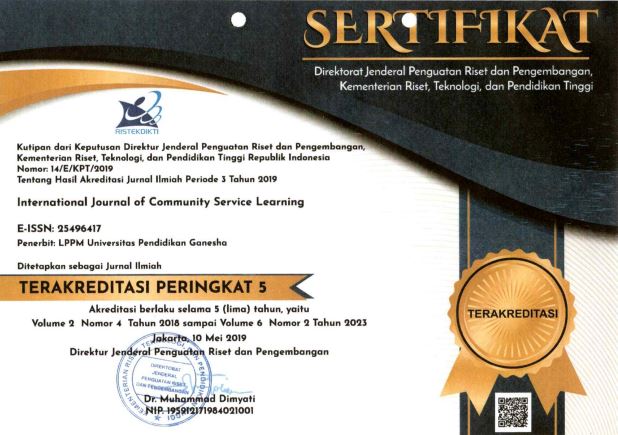Empowerment of Health Cadre in Managing Antenatal Class in Tulikup Village, Gianyar-Bali
DOI:
https://doi.org/10.23887/ijcsl.v4i4.22284Abstract
Lack of public awareness and knowledge of pregnant women in maintaining their health during pregnancy was one of the problem found in Tulikup Village, Gianyar-Bali. The limited number of health workers in Puskesmas has resulted in the lack of information obtained by the community regarding pregnancy, childbirth and the puerperium. Therefore, cadre empowerment programs as a driving force in managing antenatal classes for pregnant women are expected to overcome these problems. This activity was held in Tulikup Village Hall, and was attended by 6 cadres and 6 pregnant women. The counseling, training and simulation method was used to increase their knowledge and skills about the antenatal class. At the end of the activity, it was found that there was an increase in knowledge regarding the antenatal class. Cadres were able to design an antenatal class, arrange the material that could be given and become a facilitator in activities in it.
References
Borghei, N.S., Tagiphour, A., Roudsari, R.L., Keramat, A. (2016). Predictors of Prenatal Empowerment Among Iranian Pregnant Women. Electronic Physician, 9(8): 2962-2969.
El-Kurdy, R., Hassa, S.I., Hassan, N.F., El-Nemer, A. (2017). Antenatal Education on Childbirth Self-Efficacy for Egyptian Primiparous Women: A Randomized Control Trial. IOSR Journal of Nursing and Health Science (IOSR-JNHS), 4(6): 15-23.
Entsieh, A.A. and Hallstrom, I.K. (2016). First-time parents' prenatal needs for A-preparation are systematic reviews and meta-synthesis of qualitative literature. Midwifery, 39: 1–11
Fuada, N. and Setyawati B. (2015). Implementation of Antenatal classes in Indonesia. Reproductive Health Journal, 6(2): 67-75.
Ministry of Health of the Republic of Indonesia. (2014). Implementation Guidelines for the Antenatal classes. Jakarta: RI Ministry of Health.
Kyrisa, J., Iwanowicz-Palus, G.J., Bien, A., Rzonca, E., Zarajczyk, M. (2016). Antenatal education: analysis of benefits of participating in prenatal education. Pol J Public Health, 126(4): 192-196.
Lucia, S., Purwandari, A., Pesak, E. (2015). Effects of the Implementation of Antenatal class on the Knowledge about Labor Preparation. Midwife Scientific Journal, 1(3): 61-65.
Nurdiyan, A., Desmiwarti, Machmud, R. (2015). Analysis of the Implementation System for Antenatal classes in Malalak and Biaro Health Centers, Agam District. Andalas Health Journal, 4(1): 1-9.
Patil, C.L., Klima, C.S., Leshabari, S.C., Steffen, A.D., Pauls, H., McGown, M., Norr, K.F. (2017). Randomized controlled pilot of a group of antenatal care models and sociodographic factors associated with pregnancy-related empowerment in sub-Saharan Africa. BMC Pregnancy and Childbirth, 17 (Suppl 2): 336.
Purwandani, S., Hastuti, P., Zuhriyatun, F. (2013). Evaluation of the Process of Implementing Antenatal class in Banyumas Regency. Midwifery Journal, 4(2): 16-19.
Puspitasari, L. (2012). Overview of the Implementation of Antenatal classes in Bangetayu Health Center, Semarang City. Undip Public Health Journal FKM, 2(1): 1054-1060.
Setyaningsih, P., Fitriyani, Ersila, W. (2016). Assistance for Antenatal classes in Efforts to Improve Maternal & Fetal Health in Kutosari Village, Doro Subdistrict, Pekalongan Regency. Presented in RAKERNAS AIPKEMA 2016 "Scientific Meeting of Research Results and Community Service", 294-296.
Downloads
Published
How to Cite
Issue
Section
License

International Journal of Comunnity Service Learning is licensed under a Creative Commons Attribution-ShareAlike 4.0 International License.













